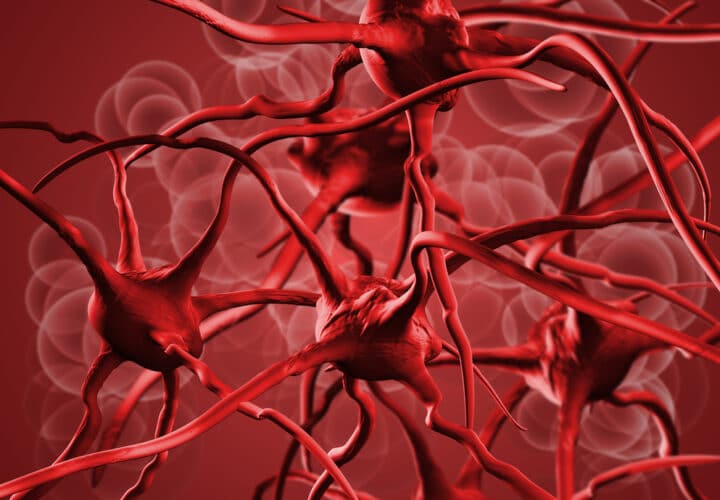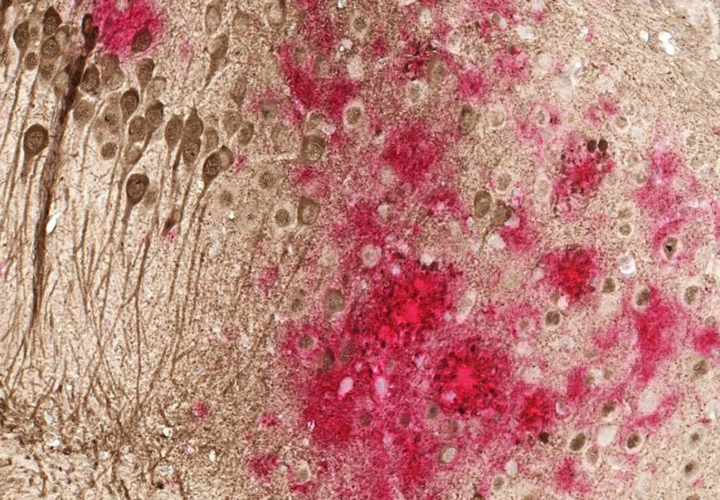Scientists tested an experimental Alzheimer's drug in mice that targets neurotransmitter receptors in the brain, and may hold promise for future treatment.
In a new study, scientists have tested an experimental drug in mice that may hold promise for future Alzheimer’s treatments. The drug involves a small molecule that boosts the function of neurotransmitter (NMDA) receptors found between brain cells.
By supporting communication between brain cells, or neurons, NMDA receptors play a role in cognition and memory. Researchers have known for some time that impairment in NMDA receptors is associated with cognitive decline and amyloid buildup in Alzheimer’s patients. It’s also linked to other chronic neuropsychiatric and neurodegenerative diseases, as well as epilepsy.
Increasing activity and function in synaptic NMDA receptors through the use of this experimental drug showed it could improve memory as well as the brain’s rhythm patterns, the study concluded.
The researchers tested the drug, simply called GNE-0723 in this early stage, on mice with Alzheimer’s disease and Dravet syndrome — a rare form of epilepsy. GNE-0723 works by reducing low-frequency oscillations in the brain, a type of activity that becomes more frequent in Alzheimer’s disease and Dravet syndrome.
Reducing these oscillations led to improved cognition and memory, and even stopped epileptic activity in the mice. After being on the treatment for several weeks, the mice actually showed improvements on learning and memory tests compared to mice that were untreated.
“What we saw after the treatment were brain-wide changes in neural activity that shift the brain to a more active state that facilitates learning and memory,” Jorge Palop, Gladstone Associate Investigator and senior author of the study, said in a news release.
Though it was done in mice, the authors of the study hope it may hold potential to be further developed down the road and tested in humans.
“This is the first time we’ve explored what this type of experimental drug does in animal models,” Jesse Hanson, a scientist at Genentech and author of the study, said in the news release. “It was very gratifying to see an effect on both the brain’s electrical activity and the animals’ behavior.”
Currently, research into finding a drug to treat Alzheimer’s is divided into several different camps. Some drugs target beta-amyloid buildup, which is still considered one of the main drivers of the disease. Biogen’s aducanumab, which fights amyloid, showed promising results in recent data and is being submitted to the FDA for approval.
Other research is aiming to develop drugs that battle tau protein, inflammation or genetics that contribute to the disease. The latest study, meanwhile, may open up a pathway for a potential therapy that hones in on a specific part of the brain — NMDA receptors.
“Before now, we haven’t had ideal tools to enhance synaptic NMDA receptors,” Palop said. “Now, the ability to specifically target these receptors opens up a lot of new possibilities for treating cognitive disorders.”






This sounds really promising, I do hope we don’t have to wait many years for this to tested and made available for patients. My sister was recently diagnosed with early onset dementia and I hope that the drugs she is currently taking help to keep it at bay.
As someone who has early signs of forgetfulness, head pain, disorientation during common activities, I am very keen to take part in trials of new altzheimers disease ie.drugs etc. I am happy to travel as I am able to drive competently. I feel strongly that research is essential to ensure a future without the fear of this awful condition that ruins lives and families. J
I am happy to undertake tests and research into Alzheimer’s disease. I am becoming more and more affected by brain disfunction, ie. forgetfulness, headache, disorientation.
My mother although suffering from dementia sometimes refers to things that have just happened., which is extremely pleasing for us. We cannot wait for this new breakthrough to become available for her and many others.
Hello I too have suffered from watching my father die from pneumonia at 57 and have full blown Alzheimers as well. His younger sister, started to develop it at 69 and was full blown by 72. She lived to the age of 85.
My cousins and myself are very aware that this could happen to us. I am now 69, soon to be 70 in March 2020. I have been exhibiting signs of forgetfulness, and am hopeful that from taking gabapentin for several years may be the culprit. I would be very grateful if you would consider me for any upcoming trials.
Thanking you,
Jo Anne McIntyre.
I had been accepted into the clinical trial of Aducanumab in 2019. I live in Burlington Vermont. The drive from Burlington to Albany Medical Center is at least 4 hours. The New York Thruway is at least an hour from Burlington. I have travelled that route over the decades, visiting a friend in NY and NJ.
Obviously, I was I extremely upset that there wasn’t any place closer where Aducanumab was being tested. Well, nowit HAS passed the clinical trial. However, only those who participated in the clinical trial will be able to continue taking Aducanumab. For the rest of the Alzheimer’s population, 4 years is a heck of a looong time to wait. Still, I have hope as I am still healthy, and just turned 70. Just my short term memory sometimes gives me trouble. However, I keep copious detailed notes and reminders both on my iPad alarm app and my dry erase board. So, I am hopeful.
Is it possible to volunteer to take part in tests? I would be very intedested. Jane
Please indicate what is involved and when/where is the program administrated? I am in the Chicago suburbs and see my memory is diminishing. I am 69 years old.